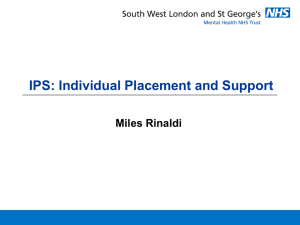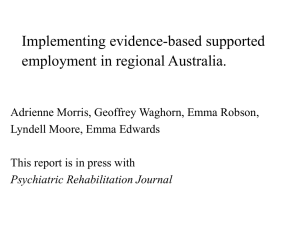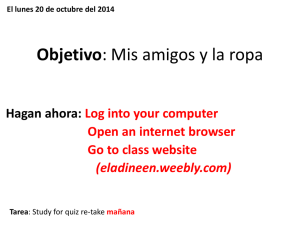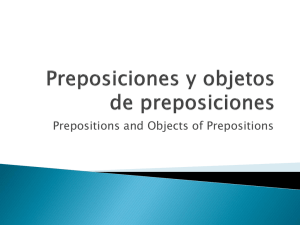Overview of MTSS and Individual Problem Solving
advertisement
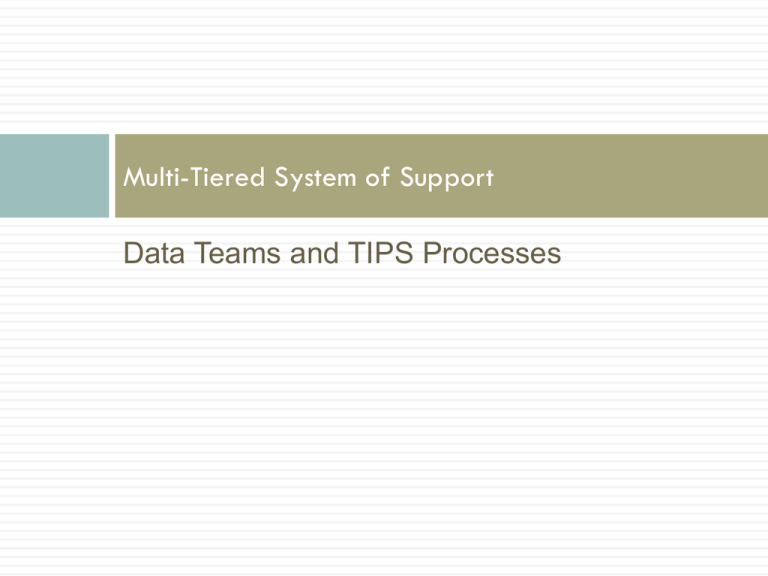
Multi-Tiered System of Support Data Teams and TIPS Processes Objectives Participants will understand the MTSS process including the steps utilized to review universal screening and progress monitoring data Participants will be able use the problem-solving process to support student needs MTSS Processes Current Processes How do you currently: determine those students who need interventions and progress monitoring, determine those students who are supported by a PEP, complete the PEP paperwork (include the form used), and complete Individual student problem solving (who is on the team, how often does it meet, etc.)? Goals of MTSS Being prevention oriented: knowing who needs support as early as possible each year and putting those supports in place Implementing evidence-based interventions for all students and tailoring interventions based on student’s needs Using progress monitoring data to know when to make a change in instruction Universal screening or progress monitoring data indicates student is at risk for developing difficulties and may need additional supports Data team meets to determine specific areas of need for groups of students and intervention to support student Structuring Team Meetings: Using Student Data Data Team Meeting Focuses on all students Includes academic, behavior, and socialemotional indicators Determines needs of individual students looking at needs of small groups IPS Team meeting Focuses on students not making progress with current interventions or those who need immediate support Includes academic, behavior, and socialemotional indicators Determines specific needs of individual students through the TIPS problem solving model EC PLC Focuses on students not making progress with current interventions Includes academic and social-emotional indicators Determines specific needs of individual students through the TIPS problem-solving model Considers possible student referrals May include the IEP team Intervention is implemented. Strategic or progress monitoring is completed by the interventionist. Parent letter is sent home and signed. Data is reviewed after 6 to 10 weeks of intervention implementation If… Then… Data points are consistently below the goal line Consider implementing the intervention with more intensity Data points are consistently above the goal line Consider increasing the student’s goal Student’s trend and goal lines are aligned Continue with the intervention until goal is reached Student’s trend line is below the goal Consider either changing the intervention or the intensity of the intervention Data is reviewed after 6 to 10 weeks of intervention implementation Communicate with Parents Send home parent letter if changes have been made Student Reaches Goal Data indicates student needs additional support and individual problem solving is necessary Individual Problem Solving Team (IPS Team) Process Data Team Meeting Interventions Data Team Meeting IPST Process Decision TIPS Processes IPS Teams Purpose To problem solve and determine next steps for students in need of additional support (Tier 3) Focus Areas Problem Solving Model (IPS Team) • Students needing additional support who are not responding to Tier 2 interventions • Students with an IEP who demonstrate an additional need - IEP team may determine additional data is needed and requests information from IPS Team through problem-solving process • All areas: behavior, socio-emotional, academic, health, etc. Facilitator IPS Team Facilitator Who Fluid Teams (determined by student needs) Frequency Dependent upon need, standing dates How does this happen? IPS Team Calendar September Tasks Identify core IPS Team members Enter team member names in Google Doc Identify meeting days, times, etc. and add to master calendar Complete Site-Based Data Accessibility Worksheet Identify Content Specialists How does this happen? IPS Team Process Meeting Preparation Meeting Preparation Schedule IPS Team meeting with key people Core IPS Team members Staff members who work with student Content specialists Submit Form O to school nurse Send home Parent Notification and Parent Input forms Review completed parent questionnaire Have student’s teacher complete Teacher Input Form Step 1 Roles and Responsibilities Be sure that at the table you have: Facilitator Data Analyst Minute Taker Staff members who work with student Content specialists Process Ella’s situation Discuss situation in mock meeting Capture meeting in writing Review sample Ella’s Situation General Information Fifth Grade Student Passed her hearing and vision screenings Parent Notification form sent Parent Input Form sent Ella’s Situation Current Data Data Source Third Grade Fourth Grade Fifth Grade Math EOG Percentile 20 12 8 Reading EOG Percentile 38 37 45 Discovery Education Math (Operations, Base Ten, Fractions, Measurement and Data, Geometry) Level 2 Level 2 Level 2 Discovery Education Reading Level 2 Reading Level 1 Comp Reading Comp Level 2 Reading Comp Discipline Referral for Insubordination No referrals No referrals Attendance 3 absences, 4 tardies 2 absences, 1 tardy 4 absences, 0 tardies Discuss Situation Based on the information shared, what is the overall problem/concern for this student? What questions do you have about Ella? What do you want to know more about? How might you obtain the information/data? Who would be responsible for obtaining that information/data? When will the information/data be obtained? Capture Meeting Review pages 1 and 2 of the IPS Team Meeting Form and note the sections for capturing: Question and Conversation Section of Form Based on the information shared, what is the overall problem/concern for this student? State problem/concern for this student based upon current data What questions do you have about Ella? What do you want to know more about? How might you obtain the information/data? Who would be responsible for obtaining that information/data? When will the information/data be obtained? Table below: Identify additional information/data needed to further define the problem/concern Review Sample Review pages 1-3 of the sample. Discuss: In what ways do these pages capture the conversation you had about Ella? How does this information guide your next steps to support the student? What do you notice about the specificity of the information? Step 2 Ella’s Situation: Information Gathering Plan: Report Out Review pages 4 and 5 of the Sample to analyze the results of a variety of additional data sources regarding Ella’s needs (Table: Who shared and what were the results?) Discuss Situation Based on the information shared, answer the following questions with your team: Who is having the problem? Are there others who are commonly associated with the problem? What is the problem? When is the problem occurring? Where is the problem occurring? Why is the problem occurring? Then, write a precise problem statement using this information to capture the primary concerns for Ella. Discuss Situation Once you have written the precise problem statement, discuss the answers to the following: What interventions will be put in place that you think will have the desired outcome? Who will implement the interventions? When will the intervention be put in place? What is the goal of the intervention? When will the team meet again to determine if the intervention is effective? How will fidelity be determined? What data will measure intervention effectiveness? How often will data be gathered? Who will review and report the data? Capture Meeting Review pages 3 and 4 of the IPS Team Meeting Form and note the sections for capturing: Precise problem statement Documentation of interventions Who When Goal and Timeline Fidelity Effectivess Review Sample Review pages 6-8 of the sample. Discuss: In what ways do these pages capture the conversation you had about Ella? How does this information guide your next steps to support the student? What do you notice about the specificity of the information? Step 3 Ella’s Situation: Monitor Impact of Solution and Compare Against Goal Solution Action (Intervention) Results Model Drawing, 3 times per week Partial Fidelity of Implementation Improved but not to Goal Dreambox for additional 90 minutes each week Partial Fidelity of Implementation Improved but not to Goal Teacher attention signal Implemented with Fidelity Improved but not to goal Affirmative to Corrective feedback in core Implemented with Fidelity Improved but not to goal Discuss Situation: Use this information and the Decision Making Tree to determine the next steps for Ella and the team. Capture Meeting Review pages 6 of the IPS Team Meeting Form and note the sections for capturing the information about fidelity shared at the meeting. Review Sample Review pages 10-12 of the sample. Discuss: In what ways do these pages capture the conversation you had about Ella? How does this information guide your next steps to support the student? What do you notice about the specificity of the information? IPS Team Purpose Step 1 Step 2 Step 3 Turn to someone next to you and explain the purpose of each one of the steps of the IPS Team meeting. Questions, Comments, or Concerns Next Steps Audience Date Purpose MTSS Coaches September 24 Overview of MTSS Elementary Assistant Principals October 7 Review data team meeting with PM data Lead Teachers October 17 Initial Training Elementary Assistant Principals November 6 Check-in on data teams and IPST processes




